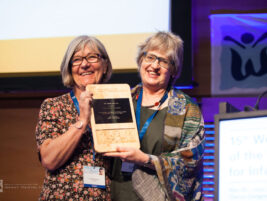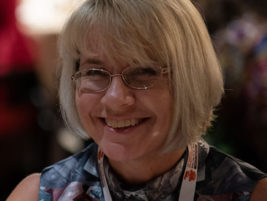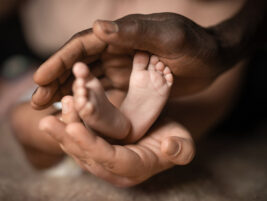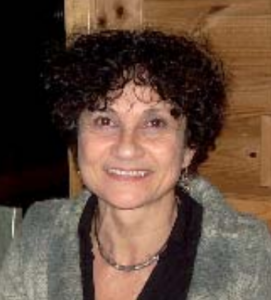
Robert N. Emde, well known to most of us, has submitted to the Board of Directors in Ako this last September, an impressive report with key available documents, and his own perspectives on the WAIMH intention to prepare a Declaration of Infant Rights. This follows a preliminary discussion on the topic, that took place in Yokohama (2008).
In general, the very need of declaration of rights arises when, for any reason, somebody in the society realizes they have become not for granted. Therefore, the very existence of a Declaration of Infant Rights is significant and important in itself, as was the Universal Declaration of Human Rights, adopted by the UN General Assembly in December 1948 (probably not by chance after the horrors of the Second World War). Though the articles, as reviewed by Bob Emde, typically begin with the word “everyone”, the declaration referred mainly to adults and their rights for protection against slavery, degrading treatment, discrimination, arbitrary arrest and invasion of privacy, rights for freedom of speech, thought, religion, movement, rights to work and leisure, and rights for security.
One had to wait for 10 years to see the Declaration of the Rights of the Child, adopted by the General Assembly of the UN in 1959. Ten principles were stated, though brief, general and more moral in tone than leading to specific actions. Still, it included important items, such as entitlement to growth and healthy development, with adequate prenatal care, nutrition, and medical care, provisions for children with special needs, right for education and play, right to be loved and supported by parents and society in general, and especially in times of adversity.
Emde has summarized these 10 principles into five basic rights of infants and young children: 1. for health and social-emotional development; 2. for positive learning experiences. 3. for caring relationships (with a special right for attachment relationships). 4. To benefit from their culture; and 5. To receive effective help in times of suffering.
In the light of these, one may wonder whether the infant’s rights are in fact different in essence from the older child’s, and whether we need a Declaration of rights specific to Infants. Though indeed these five basic rights apply to children of all ages, the relative lack of awareness that infants are capable of emotional intelligence and consequently develop non verbal, mainly somatic symptoms of emotional distress in adverse situations, creates the need for a Declaration, specific to infant rights, in general and more specially the emotional and developmental ones. Bob Emde concluded his comprehensive report with the following recommendations to the WAIMH Board:
1. To form an initial list of rights, after affirming the infant rights as articulated in the UN Declaration of Human rights and in the Convention on the Rights of the Child and adding points not covered in these documents.
2.To facilitate active dialogues that will ultimatively lead to the improvement of the initial list of Rights. In order to create such a dialogue, thee is a need to connect and collaborate with those who have already been involved in global human rights work, such as the UN Committee on the Rights of the Child, that is an independent group of experts, together with the Society for Research in Child Development, professional groups such as Zero To Three, WHO, IACAPAP, etc…and some non governmental organizations such as Amnesty International, Human Rights Watch and Global Exchange. This collaboration will enable WAIMH to learn about experiences of other groups in promoting human rights. In parallel, this learning process needs to me culture-sensitive, in order to find ways of applying universal human rights within varying cultures and political systems.
3. Putting into action: identifying places where infants rights are at risk or are clearly violated, and planning for intervention strategies. For example, this may be extremely relevant to infants who live in areas of political violent conflicts. In these places, infants, toddlers, and children from both sides of the conflict, suffer from PTSD, family breakdown, parental depression and anxiety, etc.. with their known long term developmental and emotional sequelae. One could imagine WAIMH acting to increase the awareness of both societies in conflict to the impact of the conflict on their infants, so that early signs of emotional distress would be detected and treated. In that way, WAIMH putting into action the Declaration of Infant Rights, would obviously not impact on the conflict itself, but could, perhaps, lessen the violation of the infants’ rights, that is inherent to growing in a chronic violent conflict. From my own perspective as a mental health professional living in a country in war, this kind of action seems to me as mostly relevant to WAIMH central aims…
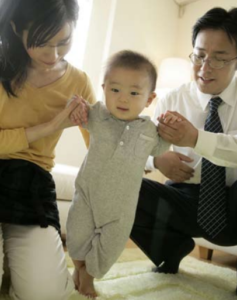
I would like to conclude with Bob Emde’s final questions, and invite all our members to reflect on them and share with us thoughts and experiences, so that the Signal can serve as means of information exchange: 1. Are we to prioritize where we consult as WAIMH members and how we consult based on our declaration? 2. How do we assert infants rights when other rights, such as freedom of speech, press, religion, assembly are violated? Or when life itself is denied? 3. Is there a hierarchy of human rights? 4. How do we deal with cultural variation? 5. How do we deal with political resistance to asserting infant rights?
Your feedback, as WAIMH members, is very much solicited. Please send it to Mark Tomlinson (markt@sun. ac.za), who is chair of the Infant Rights Task Group, to myself (ofkeren@internet-zahav.net) and with a copy to the WAIMH office (office@ waimh.org).
Authors
Keren, Miri,
the Editor of Signal,
Israel




